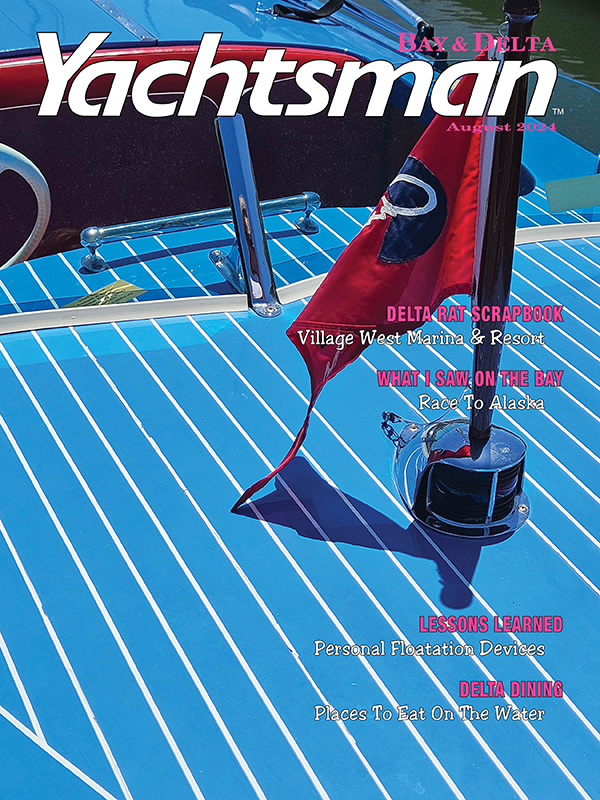Lessons Learned – by Pat Carson

Renaming Your Boat
As most of us know, these past 18 months have seen a tremendous number of used yachts changing owners. As part of the new boat ownership, we are always inclined to change the boat’s name to something more personal or appropriate for the vessel’s new intended purpose. Why have a boat named FISH KILLER if your new purpose is to cruise around the Delta and Bay with a fine cigar, a glass of Port and a few friends aboard. The naming of a boat is a very personal matter, and one that reflects not only the character of the boat, but the owner’s character as well. However, everyone should know that changing the name of a boat will bring bad luck if not done properly.

When a boat changes owners, its name usually changes as well. But unfortunately, most people in this “enlightened” day and age ignore one of the most basic tenets of seafaring folk, and take much too lightly the fine art of dealing with the gods. Many generations of sailors respected the traditions and lived by them. Were all those old salts merely ignorant or fearful? Did they not believe in modern science? Probably not, by following traditions and respecting superstitions, they were just being good seamen by being careful. A vessel’s name, seemingly only as lasting as the next coat of paint, is nothing short of the most important item to consider after buying a new boat. We all know someone who purchased a boat and just had a new name painted on the transom, not bothering to follow tradition. And we also know many of those boat owners who have had their share of bad luck. Mess with Poseidon at your own risk.
But what to do if you just cannot live with that old name? Change it, of course! But do it right so you don’t bring bad luck upon your prized yacht and all of those that travel with you. In the early days of shipping, boats were built for either commercial or military purposes. Commercial boats included fishing, cargo, passenger and utility, and were owned and operated by businesses that intended to make a profit. As boats were sold and purchased, even hundreds of years ago, the various government authorities wanted to collect taxes, fees and assessments on these commercial transactions. Unless a change of ownership was documented, changing the name of a vessel was the most obvious way to advertise that a large transaction had just taken place. So, it was considered “unlucky” to bring unwanted attention to the change of ownership, especially from any taxing authority. Besides, commercial vessels keeping the original name may help to maintain or enhance their status in their maritime industry, unless for some reason the old name adversely impacts their new business. Changing the name of a military ship had no strategic value; their good or bad luck depended more on who was in charge of the ship and where they were than if the name was changed.

That is one side of the story, however. Since the very first ships were put to sea, sailors have sworn that there are lucky ships and unlucky ones, and the unluckiest of them all are the ones who have had their names changed, defying the gods. Most people, preferring to shy away from tempting the unknown, will just keep the same name. Sure, they will use some excuse like they don’t have time, or that good boat graphics are too expensive, but they’re really just trying not to anger Poseidon, the lord of the deep.
According to Greek mythology, Poseidon records each and every ship in the Ledger of the Deep. Therefore, if you decide to change the name of the boat you must first ask Poseidon to strike your boat’s name from his records. Before asking however, you must first remove each and every trace of the old name. Do not leave anything behind; even a small item with the boat’s old name left in a locker will offend the gods, and can lead to doom.
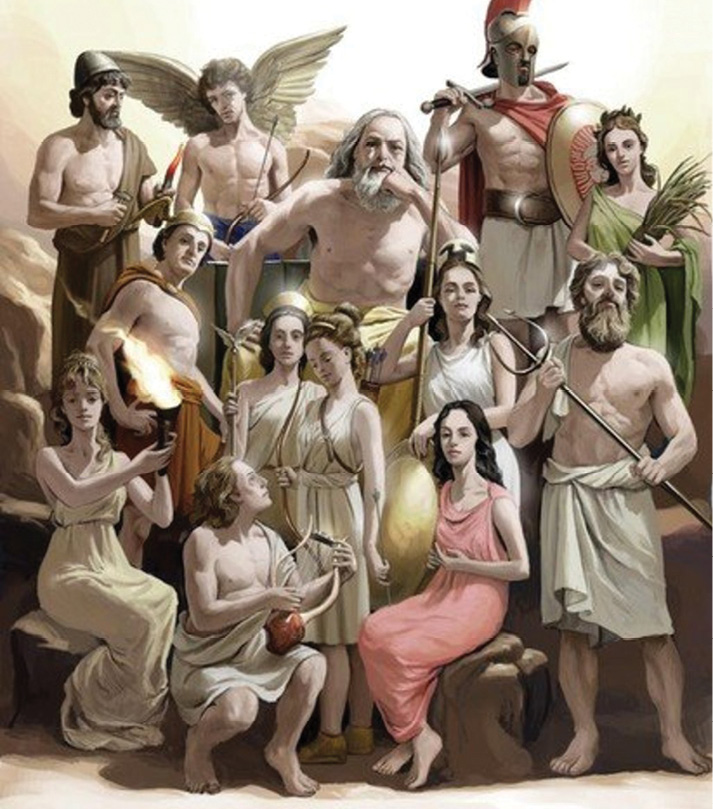
After doing much research, it seems that a book written by John Vigor with denaming and renaming ceremonies covers just about all the bases. With the book in hand, recanting the proper words, a few bottles of champagne ready and friends gathered, you are ready to start. Well almost. One last decision to make, with the three bottles of champagne, one for the denaming ceremony, one for the renaming ceremony and one for the guests, what is your course of action if the three bottles are not of the same quality? Should you use the “good stuff” for the past good luck in the denaming ceremony, the future good luck in the renaming ceremony or for you and your guests to drink? This is a difficult question, and unfortunately the book does not address this dilemma. I believe that it is safest to use the best bottle for the denaming since we are thanking the gods for the vessel’s past protection, and to be accorded all the past privileges once renamed. Besides, I think we all agree that even the gods understand that a new boat owner does not have a lot of money left over after outfitting the new yacht, and would understand that the champagne would not be top shelf for the renaming ceremony.
Here is the exact wording of Vigor’s Interdenominational boat denaming ceremony. Gather your guests on the foredeck of the boat, have a good bottle of champagne at the ready and speak these words out loud so that the gods can hear you:
“In the name of all that have sailed aboard this ship in the past, and in the name of all who may sail aboard her in the future, we invoke the ancient gods of the winds and the sea to favor us with their blessings today.
“Mighty Neptune, king of all that moves in or on the waves, and mighty Aeolus, guardian of the winds and all that blow before them:
“We offer you thanks for the protection you have afforded this vessel in the past. We voice our gratitude that she has always found shelter from the tempest, and been given safe passage to port.
“Now, wherefore, we submit this supplication:
“That the name whereby this vessel has hitherto been known (speak the old name of your boat) be struck and removed from your records.
“Further, we ask that when she is again presented for blessing with a new name, she shall be recognized and once again be accorded the privileges she previously enjoyed.
“In return for which, we rededicate this vessel to your domain in full knowledge that she shall be subject as always, to the immutable laws of the gods of the wind and sea.
“In consequence whereof, and in good faith, we seal this pact with a libation offered according to the hallowed ritual of the sea.”
Now is the time to pop the cork, shake the bottle and spray the champagne over the bow. Be generous, pour the entire bottle and don’t keep any for yourself, the gods will know! And do not use cheap champagne, the gods will know!
If you are ready to jump right into the renaming ceremony, have more champagne ready. Again, don’t be cheap and try to use the same bottle of champagne for both ceremonies, the gods will know! A caution here to not bring aboard, under any circumstances, any item baring the vessel’s new name until both the denaming and renaming ceremonies have been completed.
The renaming part is short and simple. Here is the exact wording of Vigor’s Interdenominational boat renaming ceremony:
“I name this ship (speak the new name of your boat) and may she bring fair winds, safe passages and good fortune to all that sail on her.”
Tradition calls that the bottle of champagne be broken on the bow of the vessel, but this simply makes a big mess and leaves shards of glass. It appears acceptable to the gods to pop the cork on that new bottle of champagne, shake and pour the entire contents of the bottle over the bow instead. Once both ceremonies have been completed, you may bring aboard any items baring the new name of the vessel. If it is absolutely necessary to have the new boat name painted on the vessel before the ceremonies, be sure to cover the name so it is not revealed before the renaming ceremony is finished.
I was a little surprised that Vigor’s renaming ceremony did not take the second step and address each of the four gods of the wind: Boreas, god of the north wind, Zephyrus, god of the west wind, Eurus, god of the east wind and Notus, god of the south wind. To be extra safe, you may want to appease these gods in your renaming ceremony as well. Following are suggested words from Boatsafe:
“Oh, mighty rulers of the winds, through whose power our frail vessels traverse the wild and faceless deep, we implore you to grant this worthy vessel (insert your boat’s new name) the benefits and pleasures of your bounty, ensuring us of your gentle ministration according to our needs. (Facing north, pour a generous libation of Champagne into a Champagne flute and fling to the North as you intone:) Great Boreas, exalted ruler of the North Wind, grant us permission to use your mighty powers in the pursuit of our lawful endeavors, ever sparing us the overwhelming scourge of your frigid breath. (Facing west, pour the same amount of Champagne and fling to the West while intoning:) Great Zephyrus, exalted ruler of the West Wind, grant us permission to use your mighty powers in the pursuit of our lawful endeavors, ever sparing us the overwhelming scourge of your wild breath. (Facing east, repeat and fling to the East.) Great Eurus, exalted ruler of the East Wind, grant us permission to use your mighty powers in the pursuit of our lawful endeavors, ever sparing us the overwhelming scourge of your mighty breath. (Facing south, repeat, flinging to the South.) Great Notus, exalted ruler of the South Wind, grant us permission to use your mighty powers in the pursuit of our lawful endeavors, ever sparing us the overwhelming scourge of your scalding breath.”
Now you should have appeased all of the gods, and it is time to pop open that third bottle of champagne for you and your guests to enjoy.
For over a decade, the BoatUS Graphics Department has been compiling a list of the most requested boat names. The ten most popular names for 2020 were: Serenity, Island Time, Scout, Pura Vida, Seas the Day, Shenanigans, Black Pearl, Cool Change, Liberty, Knot on Call.
I know my boat name is not on that list, or any list from the past ten years for that matter, how about yours?
Have a good story to tell, send me an email. patcarson@yachtsmanmagazine.com. I love a good story and may use it as an article, with your permission of course. H
SIDEBAR
A Primer on Greek Deities of the Sea.
In Greek mythology, the Twelve Olympians were the principal deities of the Greek pantheon, residing atop Mount Olympus. The Olympians gained their supremacy in a war of gods in which Zeus led his siblings to victory over the Titans.
Poseidon – (referred to as Neptune by the Romans) one of the 12 Olympian deities, is brother of Zeus and Hades, god of the oceans, seas and earthquakes. His weapon is a trident, which can shake the earth and shatter any object. He is second only to Zeus in power amongst the gods. The division of the universe involved him and his brothers. Poseidon became ruler of the sea. Zeus ruled the sky and Hades got the underworld.
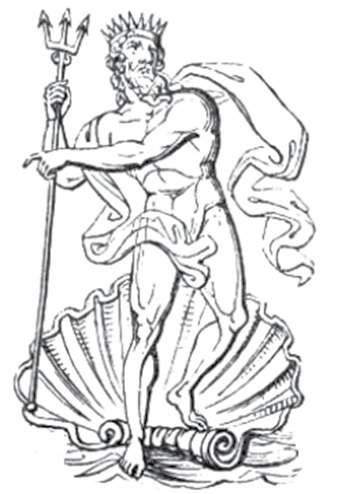
Aeolus is also called Astraeus, Greek god of the dusk and son of Poseidon. His wife was Eos, goddess of the dawn, and together as nightfall and daybreak they produced many children who are associated with what occurs in the sky during twilight. Four of their sons were the Greek gods ascribed to a cardinal direction from which the winds came, the season and weather conditions:
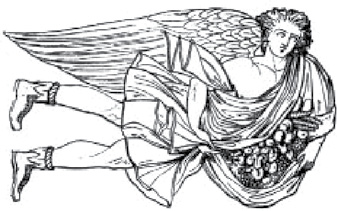
Boreas – god of the cold north wind and bringer of cold winter air and storms. His name meant “North Wind” or “Devouring One.” Boreas is depicted as being very strong, with a violent temper to match.
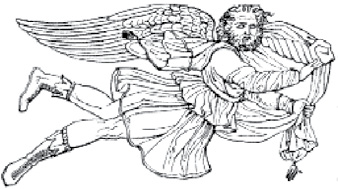
Notus – god of the hot south winds and bringer of fog and the storms of late summer and fall. He was associated with the desiccating hot wind and the rise of Sirius after midsummer, and was thought to bring the storms of late summer and autumn. He was feared as a destroyer of crops.

Zephyrus – god of the gentle west winds and bringer of light spring and summer breezes. The gentlest of the winds, Zephyrus is known as the fructifying wind, the messenger of spring. It was thought that Zephyrus lived in a cave in Thrace.
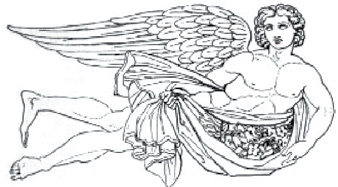
Euros – god of the unlucky warm east winds and rain. He was thought to bring warmth and rain, and his symbol was an inverted vase spilling water.
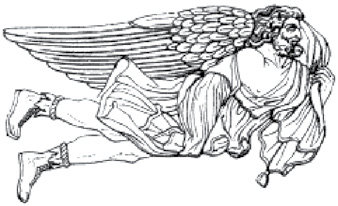
Until next month please keep those letters coming. Have a good story to tell, send me an email at patcarson@yachtsmanmagazine.com. I love a good story.

